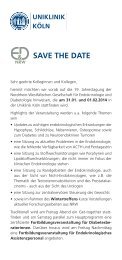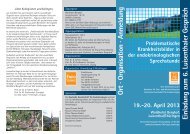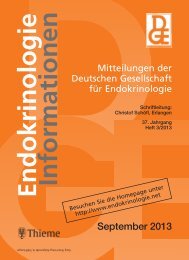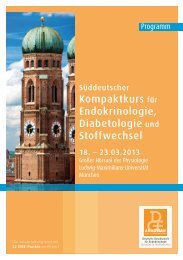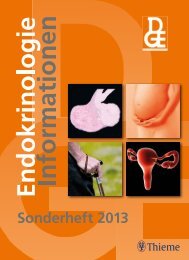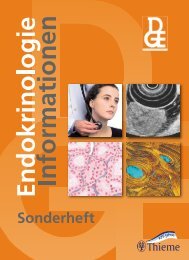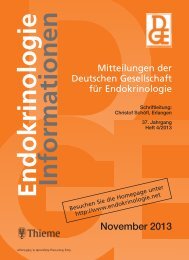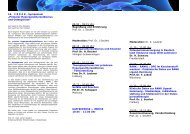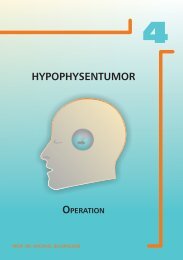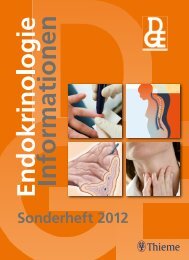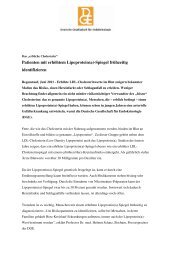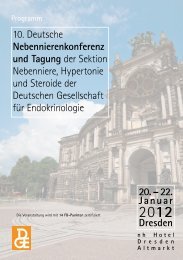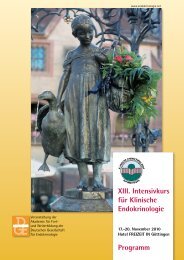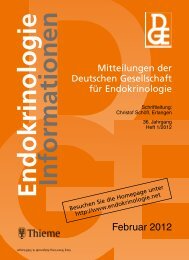Heft 2/2013 - DGE
Heft 2/2013 - DGE
Heft 2/2013 - DGE
Erfolgreiche ePaper selbst erstellen
Machen Sie aus Ihren PDF Publikationen ein blätterbares Flipbook mit unserer einzigartigen Google optimierten e-Paper Software.
36 | Preisverleihungen<br />
non-significant trends for associations with higher<br />
FSH and reduced testicular volumes. However, in the<br />
combined model, FSHR 2039A>G significantly modulated<br />
the more dominant effect of FSHB -211G>T on<br />
serum FSH and testicular volume among the T-allele<br />
carriers.<br />
By analysing both SNPs for the first time, we convincingly<br />
show that indeed FSHR 2039A>G has an effect<br />
also in males. In the proposed model of the combined<br />
effects, FSHB -211G>T acts strongly on male reproductive<br />
parameters while the FSHR 2039A>G effects were<br />
approximately 2 to 3 times smaller. Clinically this is of<br />
importance because oligozoospermic patients carrying<br />
unfavourable variants affecting FSH action may benefit<br />
from FSH treatment.<br />
Very recently, we could also show for the first time that<br />
the FSHB -211G>T T-allele was associated with both<br />
higher FSH (0.99 U/l per T-allele) and LH levels (1.30<br />
U/l) and with reduced progesterone (-1.96 ng/ml) in<br />
365 thoroughly characterised women with normal<br />
menstrual cycle intervals and proven ovulation. Gender<br />
specific mechanisms, probably involving progesterone<br />
in females, may explain the partially opposing findings<br />
concerning FSHB -211G>T.<br />
In conclusion, the SNPs in the FSHB and FSHR genes<br />
have significant impact on reproductive parameters in<br />
both sexes and the combinatory effects of variants in<br />
hormone and receptor are an unparalleled example in<br />
endocrinology.<br />
Tüttelmann F, Laan M, Grigorova M, Punab M, Sõber S, Gromoll J. Combined<br />
Effects of the Variants FSHB -211G>T and FSHR 2039A>G on Male<br />
Reproductive Parameters. J Clin Endocrinol Metab 97:3639-47 (2012)<br />
Schüring AN, Busch AS, Bogdanova N, Gromoll J, Tüttelmann F. Effects<br />
of the FSH-ß-subunit promoter polymorphism -211G>T on the hypothalamic-pituitary-ovarian<br />
axis in normally cycling women indicate a<br />
gender specific regulation of gonadotropin secretion. J Clin Endocrinol<br />
Metab 98:E82-6 (<strong>2013</strong>)<br />
Kurz-Lebenslauf<br />
geboren 04. April 1975<br />
Dr. med. Frank Tüttelmann<br />
Institut für Humangenetik, Universität Münster<br />
Vesaliusweg 12-14, 48149 Münster<br />
frank.tuettelmann@ukmuenster.de<br />
Ausbildung und Berufstätigkeit<br />
2012 Anerkennung Facharzt für Humangenetik<br />
2012– Vorstandsmitglied Deutsche Gesellschaft für Andrologie<br />
2009– Mitglied der European Academy of Andrology<br />
2008– Assistenzarzt/wiss. Mitarbeiter, Institut für Humangenetik, Universität<br />
Münster<br />
2006 Clinical Andrologist der European Academy of Andrology<br />
2006 Promotion zum Dr. med. an der Medizinischen Fakultät der Universität Münster<br />
2006– Gründer und Präsident des International Network for Young Researchers in Male Fertility<br />
2004–2008 Assistenzarzt/wiss. Mitarbeiter, Institut für Reproduktionsmedizin, Universität Münster<br />
2004 Approbation als Arzt<br />
2003–2004 Arzt im Praktikum, Institut für Reproduktionsmedizin, Universität Münster<br />
1995–2002 Studium der Humanmedizin, Ruhr-Universität Bochum<br />
Awards<br />
<strong>2013</strong> Young Andrologist Award der International Society of Andrology<br />
2012 Preis des Journal of Endocrinology (European Congress of Endocrinology)<br />
2009 Clinical Research Award des IZKF Münster<br />
2009 Forschungsstipendium der Deutschen Gesellschaft für Andrologie<br />
Endokrinologie Informationen 37 (<strong>2013</strong>) 2



